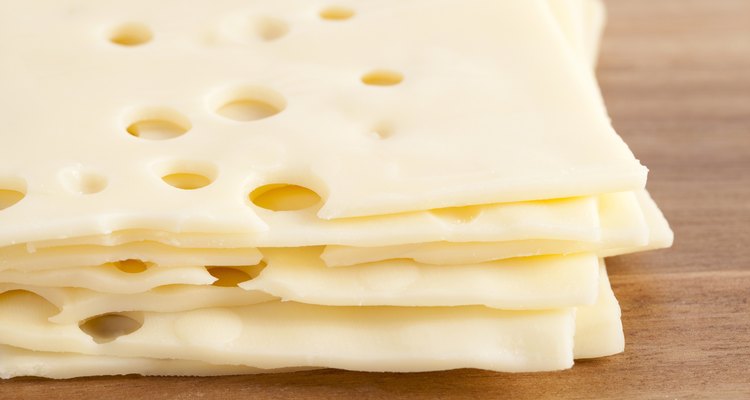
delmonte1977/iStock/Getty Images
Both Swiss and American cheeses are made from cow's milk. Swiss cheese can refer to any number of cheeses originating in Switzerland and is characterized by large holes that result from carbon dioxide released from the product during aging. American cheese is a highly processed product that has more preservatives and artificial colors than Swiss cheese, and is generally less nutritious. Both cheeses are a rich source of fat, protein and minerals.
Calories
Swiss cheese has greater energy value, with 380 calories per 3.5 oz. serving vs. the 239 calories in a similar serving of American cheese. A calorie is simply a measure of heat, but is an accurate way to estimate the amount of energy a particular food provides to the body. Most adults need at least 2,000 calories a day, and a 3.5 oz. serving of Swiss and American cheese provides about 19 and 12 percent a typical adult's minimum daily caloric requirement, respectively.
Fat
Most of the weight in Swiss cheese comes from fat. Each 3.5 oz. serving of Swiss cheese contains 27.8 g of fat, while a 3.5 oz. serving of American cheese contains 14 g. Both cheeses are high in fat, as a typical 2,000-calorie diet calls for about 44 to 78 g of this macronutrient daily. While the body needs fat in moderate amounts for energy, vitamin storage and organ protection, exceedingly high fat intake can influence weight gain and atherosclerosis.
Protein
Each 3.5 oz. serving of Swiss cheese contains 26.93 g of protein, while a 3.5 oz. serving of American cheese contains 16.7 g of this macronutrient. Protein is a key component of the structure of the body's cells and helps build and repair cellular tissue. A 2,000-calorie diet calls for about 50 to 175 g of protein each day.
Carbohydrates
A 3.5 oz.serving of American cheese contains 11.6 g of carbohydrates, while a 3.5 oz. serving of Swiss cheese contains 5.38 g of this macronutrient. Most adults need about 225 to 325 g of total carbs each day. The body converts carbs into glucose, or blood sugar, and uses it to fuel its energy needs.
Minerals
Both Swiss and American cheeses are high in calcium, with about 79 and 56 percent of the daily value for most adults for this mineral, respectively. Both Swiss and American cheeses are also high in phosphorus, although American cheese contains slightly more. Swiss and American cheeses are high in zinc and selenium as well, although Swiss cheese contains more of each. Minerals play a vital role in all the processes that control energy metabolism, central nervous system function and immune system health.
American cheese contains 1,345 mg of sodium per 3.5 oz. serving. Adults should limit sodium intake to 1,500 mg daily to avoid high blood pressure, according to the American Heart Association. A similar serving of Swiss cheese contains 192 mg of sodium.
Vitamins
Both Swiss and American cheeses are high in B-vitamins and vitamin A, although Swiss cheese generally contains about twice the vitamin B content as American cheese. B-vitamins help regulate the cellular processes that convert nutrients into energy and help build red blood cells, while vitamin A is important for healthy eyes, skin and teeth.
Related Articles

Provolone Cheese Nutrition Information

Fat Grams in Cheese
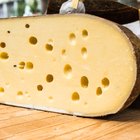
Swiss vs. Cheddar Cheese Nutrition ...
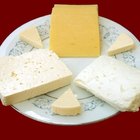
What Makes a Cheese Mild, Medium or ...
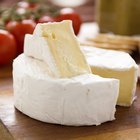
Which Cheeses Are Lower in Fat?

Peanuts Vs. Pistachios
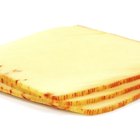
Muenster Cheese Health Benefits

Is Fat-Free Sour Cream Healthy?

How to Set the Time on a Rolex Daytona

Meat & Cheese Diet
Nutrition Information for Onken Yogurt

How Do I Set Mickey Digital Sport ...

Buttered Toast & Bodybuilding

Vitamins for Mental Alertness
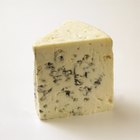
The Dangers of Roquefort Cheese

How Many Calories in a Taco Bell Bean ...

How to Store Cheese

How to Look More Masculine in the Face

The Differences Between Men's & Women's ...

Nutrition Information on Blueberries
References
Resources
Writer Bio
Graham Ulmer began writing professionally in 2006 and has been published in the "Military Medicine" journal. He is a certified strength-and-conditioning specialist with the National Strength and Conditioning Association. Ulmer holds a Master of Science in exercise science from the University of Idaho and a Bachelor of Science in psychology from Washington State University.
Photo Credits
delmonte1977/iStock/Getty Images